The impact of American tariffs on board game publishers remains a substantial threat to the longevity of nearly every publisher, from the most extravagant to the most studied and cautious. I wrote three weeks ago now, as the first wave of tariffs on imports of Chinese goods kicked off. The reality is far bleaker than the specifics those 21 days ago, with the 54% tariff rate having now raised to 145%.
The reality of the situation, as you’ll read here, is that some publishers will need to raise costs, having an inflationary effect on board games; others will simply go out of business. Some might reduce the scope of the games they produce, or they’ll shutter new developments and focus on ‘sure things.’ Whatever the case, we can be certain that they’ll be impacted.
Greater than Games, publishers of Spirit Island and Sentinels of the Multiverse, among others, has reduced their team significantly. R. Eric Reuss, designer of Spirit Island but not an employee of the company, posted about the news. The company is owned the conglomerate Flat River Group,
CMON, known for their miniature-heavy crowdfunding campaigns, has paused all future game development and laid off an unspecified portion of their staff. They have a staggering 10 games unfulfilled, which means they’re looking at some real uncertainty — these are crowdfunding campaigns that have completed and they’ve collected funds. The ever-excellent BoardGameWire went in depth on CMON and others, including Underdog Games and retailer Boardlandia.
Jamey Stegmaier, who runs Stonemaier Games, told CNN that his company was “weathering the storm.”
“For now, we’re treading water; we’re weathering the storm. We’re taking a more conservative approach for games that we make for the holiday print run that we’re going to start soon. If it holds for months or even years, it will probably be the end for most board game publishers. At the very least, we sell 35% of our products to countries outside the U.S., so we might just be a smaller company that sells to other countries instead of retailers and customers in the U.S.”
Jamey has long been one of the prominent voices in American board game publishing, initially establishing an authoritative voice around publishing games on Kickstarter. His most recent blog entry, “How Can We Fix This Together? (Tariffs, Manufacturing, and a Solution),” focuses closely on the reality of publishing games in the United States, proposing several ways publishers can do so.
Further, Stonemaier Games has filed suit in party with several small businesses against U.S. Customs and Border Protection. The complaint states that Stonemaier could reasonably face $1.5 million in tariffs to import games that the company is currently holding in China.
When we consider the scope and scale of the board game industry, as well as the fact that nobody’s getting particularly wealthy publishing hobbyist-focused games, it’s easy to see how the tariff situation could spell disaster for board gaming in the United States, and the ripple effects of that would undoubtedly be seen globally.
Publishers with active crowdfunding campaigns have addressed all this in several ways, in my experience. Some have opted to not increase costs — these are more rare, certainly. Allplay and Leder Games are two that have taken this approach, and notably, both have strong direct channels for their products. A quick survey of campaigns I’ve backed on Kickstarter and Gamefound is illustrative.
Allplay didn’t charge an additional fee, and they retained their heavily subsidized shipping fee of just $4.
Flatout Games has committed to delivering their games and stated they’ll be “working on potential strategies,” though they’re at a point in their production that they can take some time to assess — and wait out potential changes.
Red Raven Games adjusted their pledge levels for Six Sojourns, abandoning plans for a retail edition of the game and a reprint of Roam.
Bitewing’s next campaign will see an additional fee for backers beyond the shipping cost, though they’re quick to note it’s a small fee and, when combined with shipping, is still generally less than what most campaigns have in shipping fees.
25th Century will not be charging an additional fee for undelivered games (they are mid-fulfillment in one major campaign) but will be opening opportunities for donating a portion of the game’s costs to the company. This is true for Thunderworks as well, and I’ve seen it on some other campaigns, too.
Several companies, including industry giants Cephalofair, will be storing their games at warehousing facilities in China until the volatility of the situation has settled.
Several smaller publishers who haven’t started production are holding off on starting production — which obviously won’t help smaller companies with already limited cashflow longer-term, but might help shorter-term.
Some smaller companies are adding a surcharge per copy when assessing shipping fees, as they’re unable to absorb additional cost.
Five more great games on Board Game Arena
Once again, I don’t want to just jam pack this newsletter with the bleak stuff. There’s some inevitability about that right now, but we can still find plenty of joy in board games. A special shout to Ginny’s aunt (well, her mom’s cousin, I suppose — so a second cousin once removed? I’m not really sure.) who stumbled on this newsletter and told me about it recently. Hello!
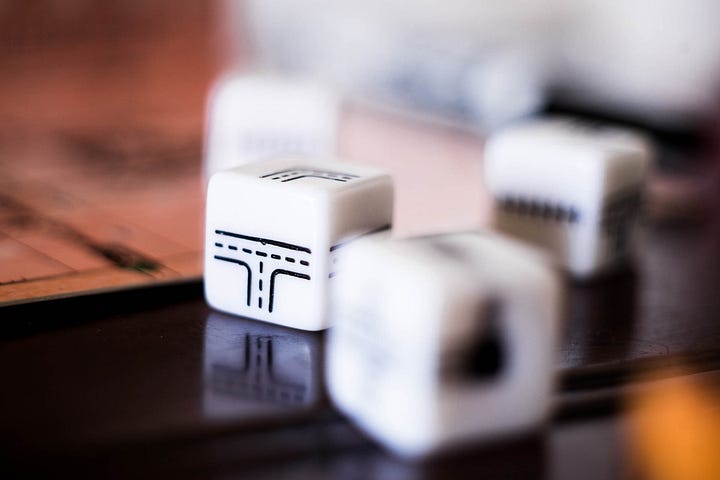
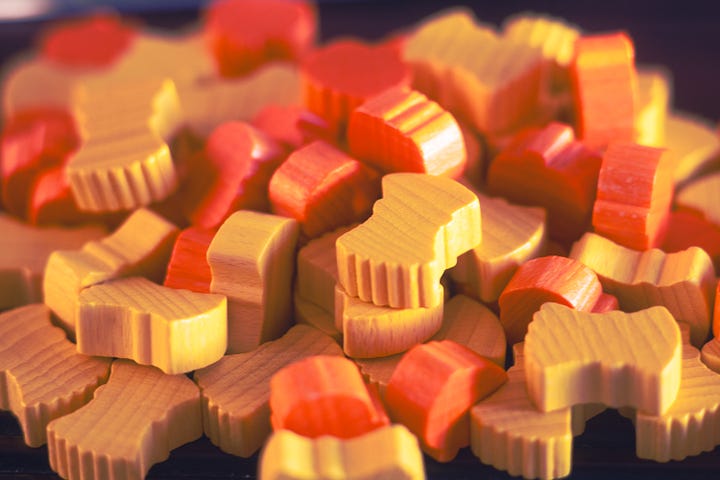
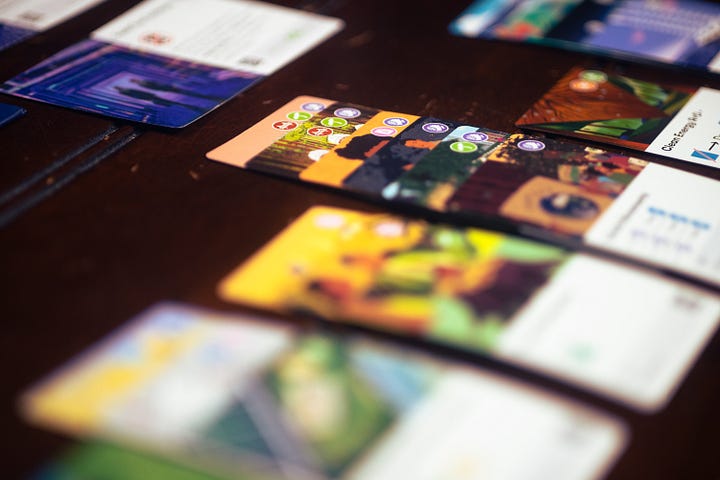
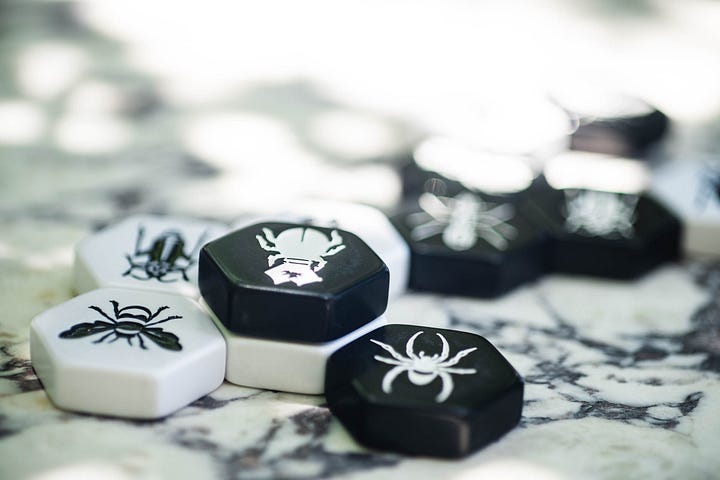
Railroad Ink (2018) is a nice implementation of one of my favorite roll-and-write games. In this series, you’re rolling dice with various directions of roads and railroad, and you’re then drawing them on your board. You’ll generally try to connect many exits off the board, as there’s a clear ramp-up as you connect more. The online version also solves my biggest irritation from the game: I’m not very good at drawing roads. This is quick and breezy, and it’s just altogether a satisfying play. Designed by Hjalmar Hach and Lorenzo Silva, illustrated by Marta Tranquilli, and published by Horrible Guild.
Panda Spin (2025) is a climbing game with double-value cards — think SCOUT (2019, Kajino) — where the cards you play flip over and come back to your hand if they’re surpassed by another player. It’s a really interesting idea, and the first two or so games I played, I was just trying to wrap my head around the strategy. I feel like I understand it a bit more now, and it’s really taken hold. I’ve got a physical copy that I’ll break out soon. Designed by Carl Chudyk, illustrated by CMYM and Wenjue Zhuang, and published by Moon Gate Design.
Agricola (2007) was one of the first worker placement games I played, and while it was a little bit of baptism by fire, I really fell in love with the design. That soft spot still exists: Unlike later Rosenberg worker placement games, you don’t have a whole slew of paths to explore. By narrowing your focus, you can learn the system in more depth. While you might not want to dive into the competitive landscape as a beginner, you can play some very quick solitaire games that’ll give you a chance to learn the game and decide if you want to go further. It’s not the best Uwe Rosenberg game, but sometimes, it’s the one I need. Designed by Uwe Rosenberg, illustrated by Klemens Franz, and published by Lookout Games.
Daybreak (2023) is a game I’ve talked about in some depth, so we don’t need to go too in-depth today. Long story short, it’s a cooperative game about tackling climate change on a global scale. It’s great. The BGA implementation is particularly nice for two reasons: First, you can play solo, and I think this is a genuinely fun solo game. Second, remote play works really well here — while you still have to figure out communication, it’s sort of well-geared for this world. Plus, the game’s great. Designed by Matt Leacock and Matteo Menapace, illustrated by Mads Berg, and published by CMYK.
Hive (2001) is a great two-player abstract game in which each player is trying to surround their opponent’s queen bee with pieces. It’s such a cool tactical game, and while I’m not particularly good at it, I’ve really enjoyed playing it with friends. (Do I want to play against the best players in the world? No, I probably do not.) I do feel like losing repeatedly has made me better at the game, and there’s a real beauty in that. Designed and illustrated by John Yianni, published by Gen42 Games.





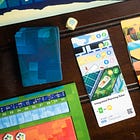
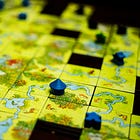
Thanks for the shout-out Matt! Love the newsletter - and appreciate you putting this run-down of the tariffs together.